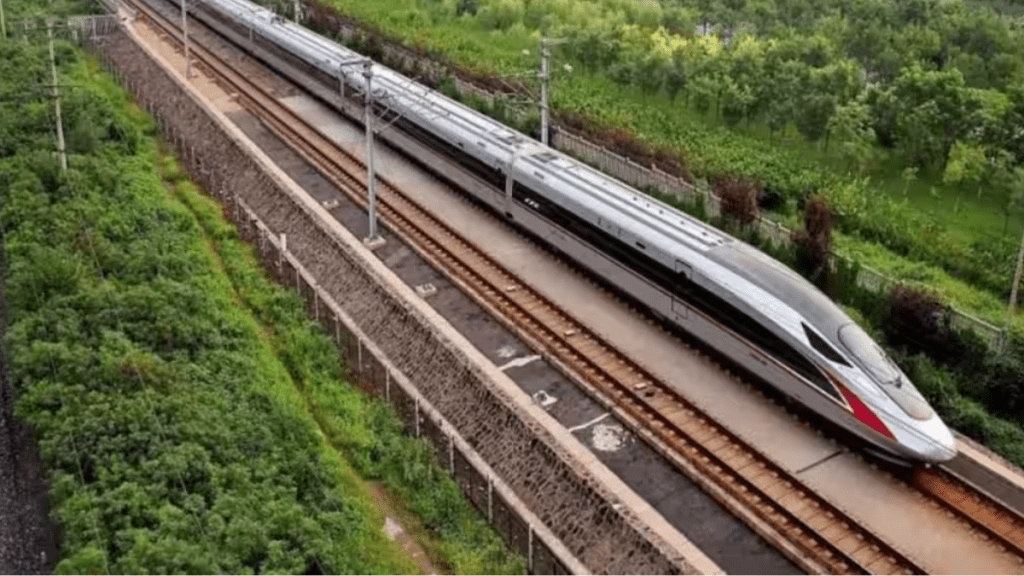By Arun Kumar Das
Faced with uncertainty and delay over the procurement of high-speed trains from Japan, Indian Railways is exploring to launch the much-awaited service with Make-in-India Bullet trains. While the rolling stock tender for procuring trains with Shinkansen technology from Japan for running at a maximum speed of 320 kmph is yet to be firmed up, Indian Railways is actively considering running an Indian Bullet train with a maximum speed of 280 kmph on the 508 km long Mumbai-Ahmedabad high-speed rail corridor.
According to highly placed sources, a concrete proposal was submitted by the National High-Speed Rail Corridor to the Railways last week in the presence of the Chairman of the Railway Board and other senior members.
As per the plan, the indigenously built Indian Bullet train with 280 kmph maximum speed will run from 2030 to 2033 between Mumbai and Ahmedabad and the Japanese bullet train will launch its operations from 2033 onwards.
The ambitious project, delayed by many years, is however gathering speed of late with work on the construction of tunnels, rail over bridges and laying tracks taking place at full throttle.
Indian Railways will install ETCS, the signalling system, required to operate high-speed trains on the Mumbai-Ahmedabad corridor. However, for the Japanese Bullet train, the Shinkansen DS-ATC signalling system would be installed after shifting the ETCS to other corridors. Sources added that they are expecting rolling stock from Japan to be made available by 2033 so Shinkansen train operations could be launched.
Made-in-India Bullet Train
The Railways had already awarded a contract to the state-run BEML to manufacture India’s first indigenously built Bullet trains for Rs 866.87 crore. These trains are being priced at Rs 27.86 crore per coach.
The Railway Board was earlier relying on Japanese technology for the Bullet Trains to run on the Mumbai-Ahmedabad rail corridor. But India may now opt for indigenously developed trains for this route since talks with the Japanese are yet to reach finality, sources close to the latest development said. BEML’s per coach cost is also far lower than Japanese estimates that wanted to bill India over Rs 46 crore per Bullet Train coach.
The Bullet Train project that started in 2016 has missed several targets so far. As per the latest position, the rolling stock contracts are yet to be finalised. According to the JICA loan conditions, only Japanese manufacturers such as Kawasaki and Hitachi can participate in the bid. The Japanese companies are expected to submit the bids by the end of February this year, as no proposal has been submitted till now.
Initially, Japanese E5 series Shinkansen trains were planned for this corridor in 2016 but now with technology moving fast, Japan is keen to supply the latest version of Bullet Train – the E10 Shinkansen. The Bullet Train project was estimated to cost Rs 1.08 lakh crore at the time of awarding the contract in 2016, which as of now has exceeded Rs 1.60 lakh crore.
Also read: Mumbai-Ahmedabad Bullet Train progress: Ashwini Vaishnaw inspects progress of undersea tunnel
Planned Bullet Train services
Meanwhile, the Railways is trying to make the first section of the 50-km line between Bilimora and Surat in Gujarat operational for the trial run of the bullet train. Indian Railways proposes to operate two types of services on the corridor. A “Rapid Train” or express service with only two stops at Surat and Vadodara, and a slower service that stops at all stations. The “Rapid Train” would complete the journey in 2 hours and 7 minutes, while the slower service would take 2 hours and 58 minutes.
In total, 70 daily services will be operated on the line, or 35 services in each direction with 3 services per hour during peak hours and 2 services per hour during off-peak hours. Trains were proposed to have a length of between 10 and 16 coaches. Each train will have a passenger capacity of between 1,300 and 1,600 passengers.
The corridor uses three depots at Sabarmati and Surat in Gujarat, and Thane in Maharashtra. The depots were designed based on the operations at Japan’s Sendai and Kanazawa depots for the Shinkansen. The corridor will have 12 stations with Mumbai, Thane, Virar, Boisar, Vapi, Bilimora, Surat, Bharuch, Vadodara, Anand/Nadiad (Kheda district), Ahmedabad and Sabarmati.
(The author Arun Kumar Das is a PIB-accredited freelance journalist covering infrastructure including railways for more than 3 decades. Views expressed are not necessarily those of financialexpress.com.)
